My name is Corvo.
I’m standing in the center of a ballroom, wearing armor and a hellish mask. There’s still wet blood on my hands from an assassination I had just recently completed. I smell of sewer rats and disease, my breathing is heavy, and my clothing is caked with mud and rust. The masquerade’s attendees have arrived to the gala wearing dazzling arrays of jewelry, silk and linen, bright colors and ornate costumes, and scented with perfumes. The wanted posters are scattered around town in heavier doses now, and my metallic face is recognized by everyone. And now they’re all staring at me.
I stick out like the sorest of thumbs.
“Amazing!”
“Novel idea!”
“Just like him!”
The socialites believe me to be mocking the killer, unknowing that I’m actually him. In fact, they consider me the center of attention now, the favorite, the best costume here. They pat me on the back and even clear space for me to move around. This works out well. My next mark is just up the stairs, and I’ll need a clean escape afterwards.
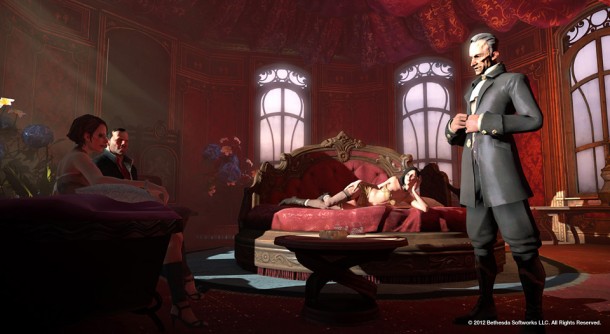
It’s a strange circumstance, but one that fits completely well within the confines of a world where politics and status level are currency. It’s the series of these seemingly unrelated details that make up the world of Dishonored, linking it together as a matrix of lies, betrayal, magic, and steam, augmented by infinite player choice. While at times these connections can individually feel loose, together they are strong, complete, and form an absolutely memorable experience.
Keeping Our Eyes Open
Dunwall, the central city where the game takes place, is an ecosystem of people and places that only work well because of how they come together. The world design comes first here, with its characters reacting to the goings-on and affecting the world in turn along the way. This opens up the game a lot, as becomes more about the connections between the places we visit than about a linear narrative path. A journey to a rooftop balcony can take place up an ornate stairway and through sprawling rooms or in the shadows, behind the wall. It can be through a rat-infested sewer or exploding through a iron gated door. The development staff at Arkane seems to bait us to try vastly different avenues of travel lest we miss something important.
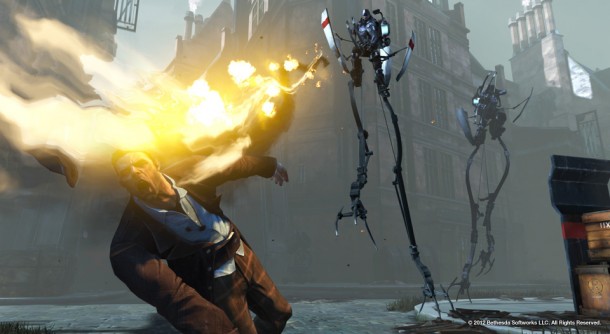
Dishonored does a great job of over-stimulating. It’d be a crime for me not to suggest keeping our eyes open at every passing detail, ingesting everything through osmosis. Strolling past whispering citizens — gossip is a huge part of how information is passed around Dunwall – we can hear things about the goings-on of the city that further paint the picture of a society’s stability on the brink. Pay attention to the way that corpses line the streets, how often rats run by, or how the people we interact with have their own idiosyncrasies and inflections in delivery. Everything has its own visceral value, and adds to the world’s ambiance that much more.
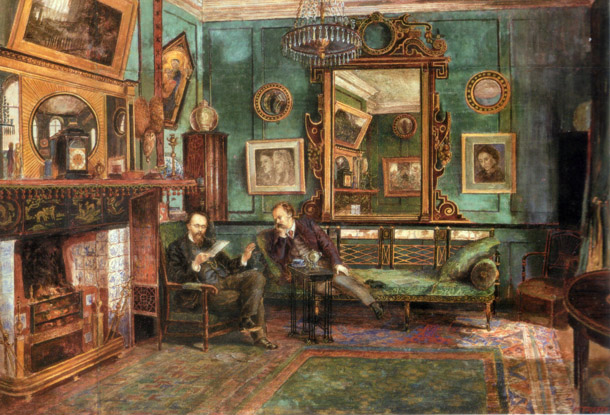
The setting has a sort of 1800’s Franco-Angelo feel to it, mixing steampunk and futuristic technology together in an art history student’s dream. It initially comes off like Victorian London, if London was in New England and robots were invented in 1776. It feels familiar, but it’s definitely not. The visual rendering even adds to this, utilizing simulated oil paint strokes and colors to push the play between light and shadow. Victorian influences, like the 1882 painting by Henry Treffry Dunn, are found throughout the game. Patina and rust are found in the city’s back alleys, with glossy, expensive varnish leading us into more elite parts of town. Though there are texts available to tell the back history of the game, the visuals do a much better job of grounding us and making us feel a part of a real world.
It’s easy to feel like I’m actually inside Dunwall. It’s something that hasn’t happened to me with a game since exploring Rapture in Bioshock. It’s a lot like reading a great book, where I’m forced to imagine the world so much that I actually see and believe it exists. It’s often exhilarating to explore, but I have to keep myself to shorter play times less I get completely sucked into it. It should come off as a warning, though, that even a slightly prolonged absence takes some time to come back from. I had put the game down for a day after an extended play session and found myself almost overwhelmed when I came back.
Familiar Territory
I mentioned earlier that the world seemed oddly familiar, even though it necessarily wasn’t. The same extends to the game’s plot. On the surface it’s fairly predictable: character gets screwed over, vows redemption, and eventually works his way up the ladder to achieve it. But, it’s not until we begin peeling back the layers that we see the real driver of plot: injustice. The need to “fix” things pushes us forward, driving us to kick away each domino in line until we’re able to knock down entire rows. It’s a narrative that’s fits perfectly well within the setting.
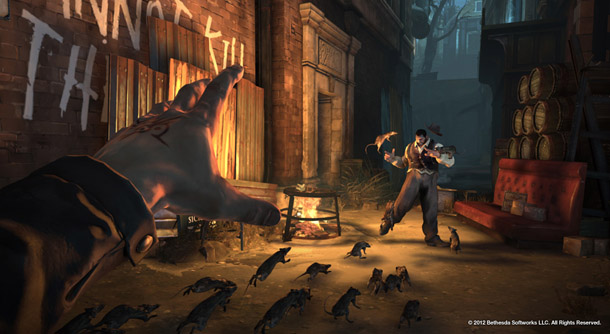
The world is completely reactive to Corvo’s actions and affects the narrative as we go along. The pile up of corpses left in our aftermath alerts guards and affects the city’s security. Letting someone survive an assassination — the game can be played through without killing — can inevitably lead them to shame and their familiars to react to Corvo differently down the line. That’s the level of story-shifting detail that many games pass on. For the most part, it’s fluid enough to make the overall plot much more exciting and enjoyable.
That’s why it’s unfortunately a shame that it’s easy to miss some of these details on just one playthrough. Arkane really does want us to experience everything that Dunwall has to offer, but it can’t be done unless we try the game a few different ways. At least they’ve gone ahead and set us up to do just that.
It’s About The Options
“Play any way you want” is something that we heard from the development team at E3. Arkane has pulled rabbits out of many hats to make each play-through have a unique, original feel, to the point where even small decisions (killing one particular mark, for instance) can lead to a completelly different experience. They’ve gone to great lengths to make sure that there is no wrong way to play the game; everything we do is right; it leads to another resolution down the line and makes for further flexibility. It’s a little bit butterfly effect, along the path to redemption.
The mechanics of Dishonored allow us to play in the shadows or in the daylight, using stealth or cannons. I found myself really enjoying the stealth aspect, which focused more on movement rather than standing still. The feeling is a lot like a wild cat stalking its prey, moving often and quickly, to find the right moment to pounce. At other times, when stalking wasn’t as enjoyable, it was just fun to start blowing stuff up and causing mayhem in streets.
It’s like the game is trying to get us to “break” it, but we can’t. It does bend a bit, though.
The mix of technology and mysticism provide terrific narrative elements to the game, but perhaps not so much to the combat. The weapons are believable, fun to use, and have a decent amount of originality to them. The rune-based powers, on the other hand, often leave a bit to be desired. A stereotypical “overseer” of sorts leaves the ability runes scattered throughout the world for Corvo to find. It feels forced, shoehorned into a world that doesn’t need the idea of an all-powerful being.
At least a few of the abilities were enjoyable. Blink, a short-distance teleportation “jump”, help to create some of my favorite “OH GOD OH GOD OH GOD” moments in the game. I was escaping from an oncoming swell of enemies at one point and leaping to certain death off of a building, only to zip across to an adjacent ledge at the last second. It’s the preferred way to travel.
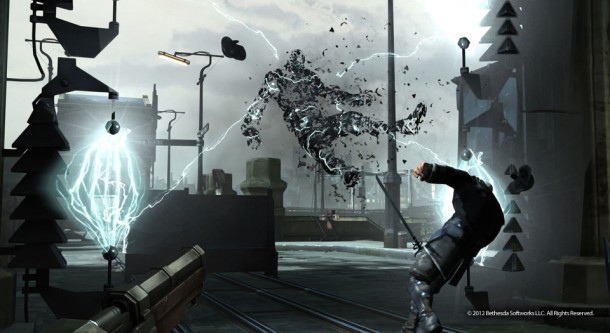
Honored
I don’t think I’ve come across a game recently with a more perfect title name. Dishonored. It’s the central focus for the game, the driving engine in a world mixed with out-of-place elements that are forced to work together. I’ve been wronged. The push to regain my honor shifts from a personal journey, to the honor of those around me, to the honor of Dunwall. I used everything the city can give me, and even some things it can’t, to regain that honor.
Dishonored. It’s as solid of a gaming experience I’ve had in years. The issues that revolve around the plot are resolved, if taken the time to fully enjoy everything the game is based on. Regardless of a few quibbles, the game is memorable and engaging, and worth several play-throughs, if not just one.
This review is based on a copy of the game for the Xbox 360 sent to SideQuesting by the publisher. It is rated M for Mature.

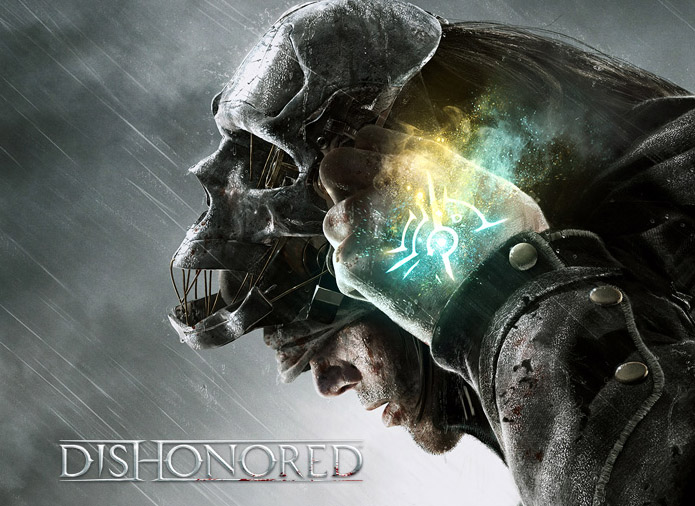
No Comments